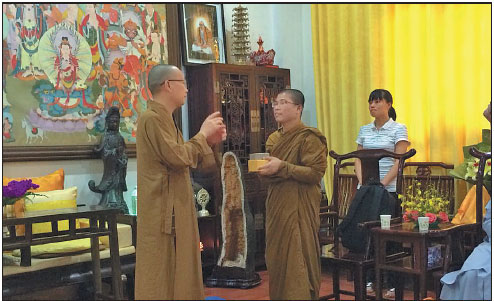Masters' program assists cultural communication
Updated: 2016-06-23 08:08
By Xu Jingxi In Guangzhou(China Daily)
|
|||||||||
|
The abbot of Liuzu Temple (left) talks with Sim Sokhaya, who is pursuing a master’s degree in Chinese history at South China Normal University in Guangzhou. Xu Jingxi / China Daily |
Course will give foreign students more insight into Chinese Buddhism
Sim Sokhaya, a monk from Cambodia, has been learning more about Chinese Buddhism at the Liuzu Temple in Guangdong province, where hundreds of worshippers gathered to celebrate the Buddha's birthday on May 14.
The 28-year-old, who is pursuing a master's degree in Chinese history at South China Normal University in Guangzhou, chanted in Chinese with the abbot of the temple to mark the special day.
As a fan of Chinese kung fu movies and costume dramas, Sokhaya has been interested in the country's culture since childhood. But it was only after coming to China for a master's program that he started to build up a comprehensive knowledge of Chinese Buddhism.
"My master sent me to China to learn the similarities and differences between Chinese Buddhism and Theravada Buddhism that is popular in my country. A better understanding of each other's cultures will facilitate communication in the future," said the young monk.
He is a disciple of the current Supreme Patriarch of the Dhammayuttika order of Cambodia and wants to open a tuition-free school in Cambodia to teach people Chinese and Chinese culture.
Sokhaya is among the first 12 foreign students enrolled by South China Normal University and the Liuzu Temple for a three-year master program.
"As China's strength grows, more and more foreigners become interested in Chinese culture and the master's program meets their needs," said Chen Wenhai, dean of the faculty of history and culture at South China Normal University.
"Meanwhile, we hope the program's graduates will serve as a bridge for cultural exchanges between China and their countries and spread Chinese culture overseas."
Buddhism is an important part of Chinese traditional culture, but the master's program provides an extensive curriculum covering many other perspectives such as Chinese philosophies and an introduction to Chinese martial arts.
All 12 students admitted last year were from Asian Buddhist countries such as Vietnam, Cambodia and Sri Lanka.
But the program is not limited to Buddhists, said He Fangyao, a professor who teaches the history of Buddhism in China.
"We also welcome believers of other religions, such as Christians," He said.
The master's program plans to expand enrollment to about 25 students this year.
Cooperation links temple, university
South China Normal University and the Liuzu Temple in Guangdong province jointly launched a master's program last year for foreigners who are interested in Chinese Buddhism and culture.
The three-year program mainly focuses on the history of Chinese Buddhism and its exchanges with different schools of Buddhism overseas. But it also has an extensive curriculum covering many other perspectives of traditional Chinese culture such as language and philosophy.
Besides taking classes on the university's campus in Guangzhou, students are also shown around temples and tourist spots that display Buddhist culture. The Liuzu Temple covers the students' study and living costs in China, as well as providing internship opportunities, while the master's degrees will be granted and issued by the Ministry of Education.
xujingxi@chinadaily.com.cn
Related Stories
In absence of religion, personalized weddings are becoming sacred 2016-03-21 07:49
Buddhists in Tibet have faith in their religion and state 2015-09-07 09:31
Religion on the plateau 2015-08-21 11:41
Book leads the way in helping to understand religion 2015-04-23 12:03
Today's Top News
EU referendum underway in Britain
Turkey may vote on negotiations with EU
Britons edging closer to voting to remain in EU
UK to opt to stay in EU: Portuguese president
Fund manager listed on London Stock Exchange
China and Poland eye major deals
Major British media divided over EU Referendum
British parliament in rare recall for tribute to Jo Cox
Hot Topics
Lunar probe , China growth forecasts, Emission rules get tougher, China seen through 'colored lens', International board,
Editor's Picks

|

|

|

|

|

|








